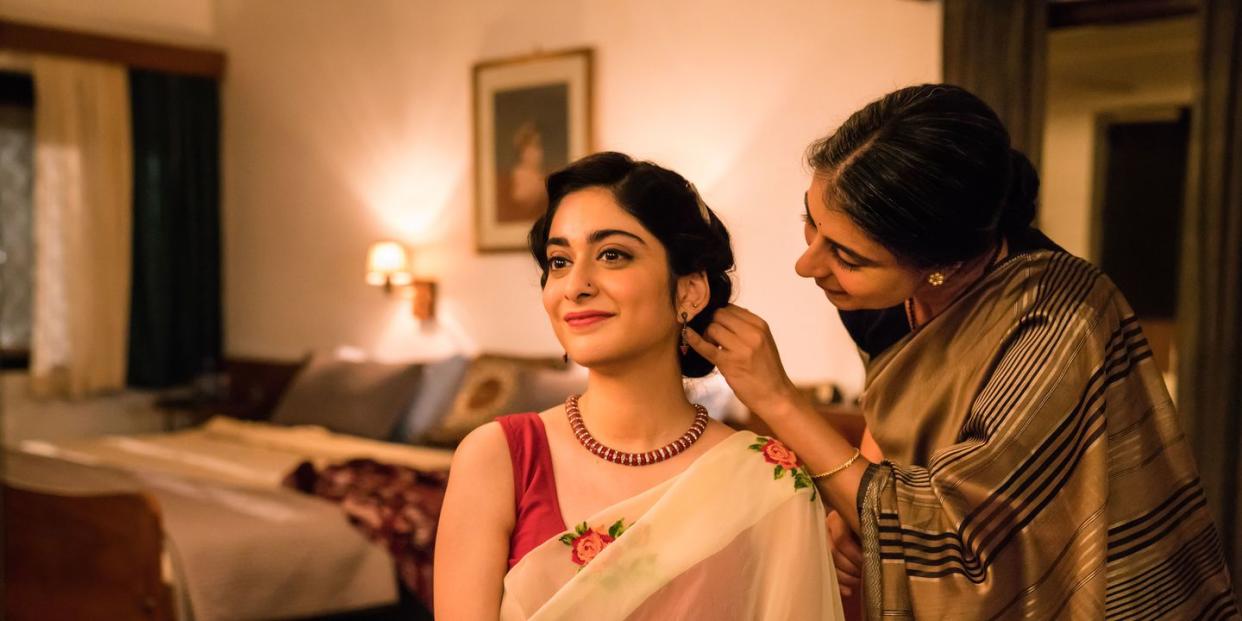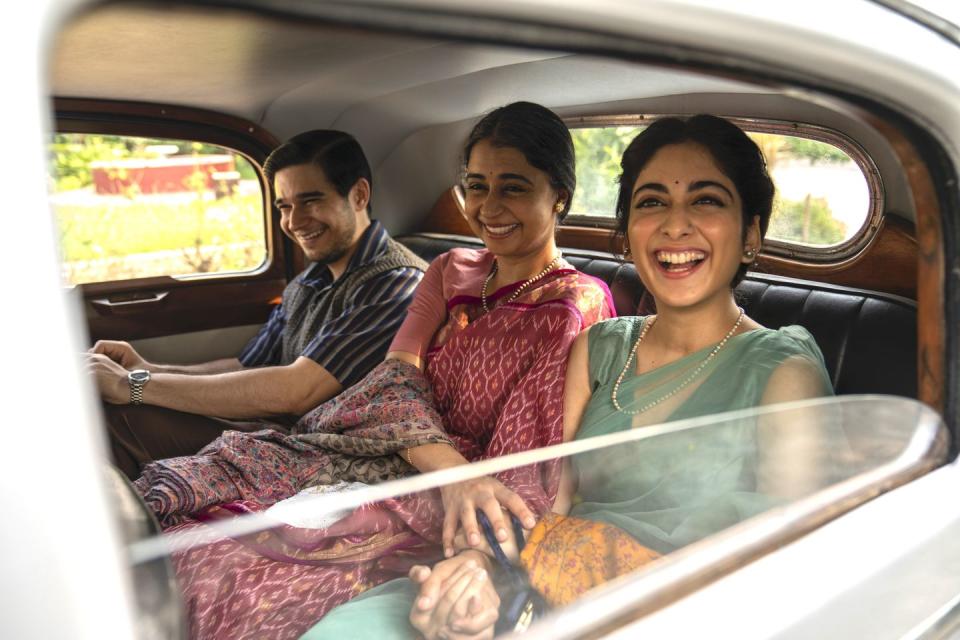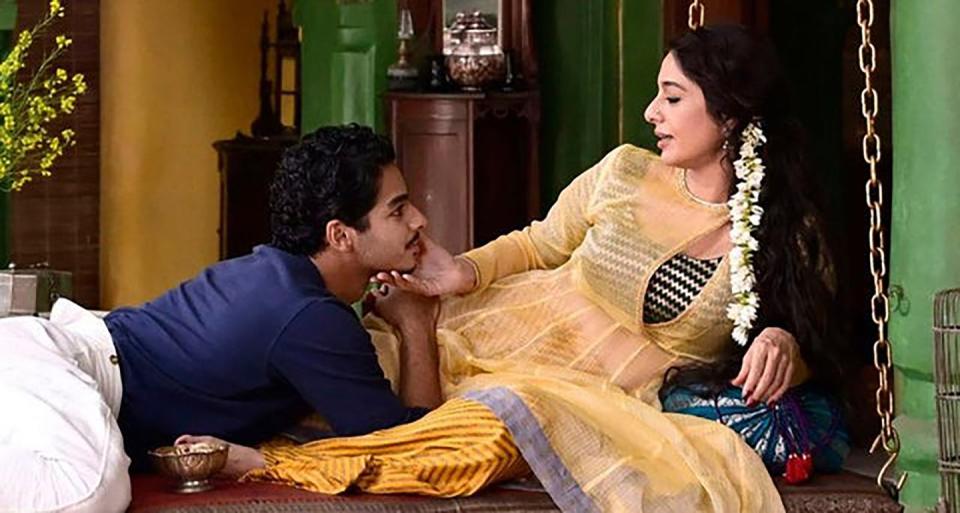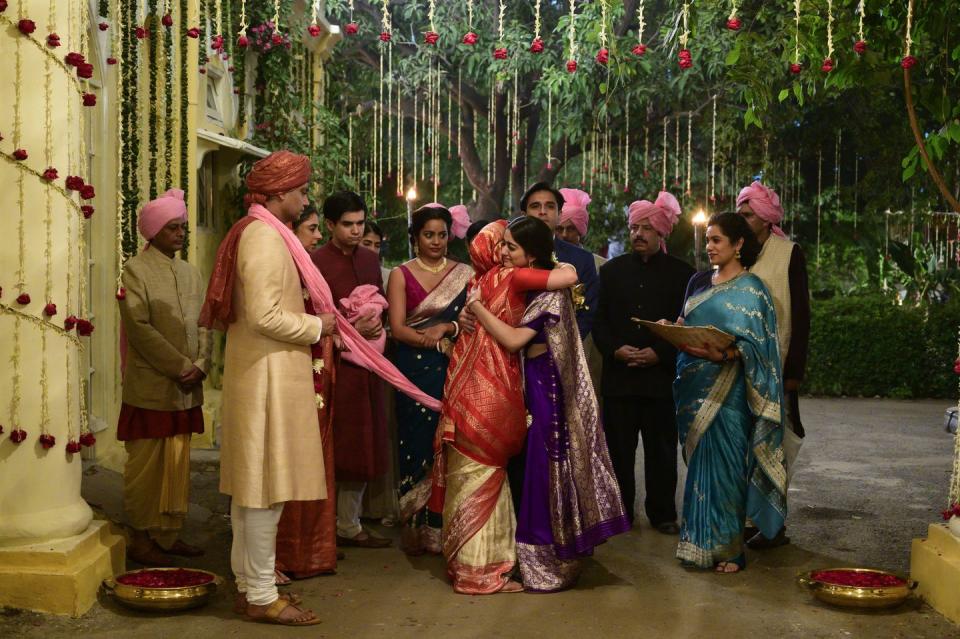Critics of A Suitable Boy's 'authenticity' are missing the point

A Suitable Boy spoilers follow.
A Suitable Boy, BBC’s splashy India-set period drama, opens with a young woman feeding a bonnet macaque with wide-eyed delight as preparations for a wedding are underway. It’s the hoariest of Indian clichés — the assumption that its denizens have a symbiotic relationship with primates. As every Indian knows, we chase away our monkeys rather than feed them, lest they come back for more. After all, this is a country where monkeys stole Covid-19 blood samples from a health worker earlier this year.
Touted as the first BBC show with an all-Asian cast — although episode two features peripheral white characters at a dinner party — the six-episode drama is an adaptation of Vikram Seth’s novel. It follows four families in 1950s India against the backdrop of various political events including post-Independence tensions and the country’s first elections. Like the novel, the show’s preoccupations lie with matters of the heart. Lata, the Elizabeth Bennet-esque protagonist is courted by three dashing suitors, one of whom is a Muslim, even as her mother searches for a suitable groom for her.

Plenty of criticism was directed at the show’s tropes about India after it premiered on July 26. The Guardian’s Chitra Ramaswamy has noted that the India seen on the show "remains an India that a British audience is used to seeing." The vibrantly illustrated opening credits even feature a cricket ball, parrots and rose petals.
The show itself adds more to the mix. There are sprawling colonial-era mansions, boat trips on the Ganges, a boozy and cruel maharajah, an ageing courtesan and clandestine love affairs between Hindu and Muslim characters. All the lead characters speak in cut-glass accents and there is only a small smattering of Urdu. The show might as well have been titled Another Indian Summer.
Like that lavish Raj-era Channel 4 show, A Suitable Boy is also ostensibly a series about the birth of modern India that's more concerned with the lives of the genteel and comely leading men. We almost expected Julie Walters to turn up and berate Lata at some point.
The many quibbles about clichés and authentic representation are not unfounded. Writers like Nikesh Shukla have rightfully criticised the BBC’s decision to hire a white man to write the show. Andrew Davies, the screenwriter behind A Suitable Boy, has penned teleplays for many a BBC drama over his decades-long career, including the 1995 Pride and Prejudice adaptation that launched every Anglophile’s obsession with Colin Firth.

That said, the insistence on authenticity in A Suitable Boy seems misplaced. The novel’s key setting of Brahmpur, based on the Indian city of Lucknow, is fictional. Moreover, the book (one of the longest single English-language works) is written in a language that a vast majority of Indians don’t access literature in.
For some, A Suitable Boy would have more claim to truthful representation if its characters all spoke in Urdu, but in an India where the lives of the rich and upper-caste have always been removed from the rest, the choice of English seems apt. By using English as the language of aristocrats and Urdu/Hindi as the languages of the proletariat, the show is uses its linguistic divide to represent class fractures, very much in the same way that Downton Abbey used accents to separate the upstairs and downstairs.
The appeal of Indian English postcolonial fiction transcends literary merit. Like other notable examples, including Arundhati Roy’s The God of Small Things and Vikram Chandra’s Sacred Games, A Suitable Boy offers readers, and now viewers, a saga not just of Indian characters, but the promise of understanding India too.
That, of course, is too high a burden to place on any show. In an era of globalisation when the limits of Indianness are constantly shifting, who decides what is reliably Indian and what constitutes a caricature? Like chicken tikka masala, a gastronomic invention by South Asian chefs based in the UK, A Suitable Boy isn’t the real deal, but that only speaks to the shifting parameters of our global culture, not its quality.

The show is directed by Mira Nair of The Namesake and Monsoon Wedding. Many of her films have deftly tackled these questions about Indian identity before. Moreover, no one would accuse Nair’s work of not having topical appeal. The first episode features a maharajah building a Shiva temple as a deliberate act of provocation right next to a mosque.
Just days after the show premiered, the Indian prime minister attended an elaborate stone-laying ceremony for a temple that will be built atop the ruins of a mosque that was destroyed by Hindu nationalists in 1992.
In A Suitable Boy, tumultuous political events like riots and sweeping land acts are commonplace. Yet history is only a tapestry against which its characters' lives play out. In a scene from the second episode, the revenue minister sombrely declares, "As long as there is inequality, there is anger. Politics is never simple." His impish son yawns in return.
Davies, a stalwart of the BBC period drama has always had a gift for distilling sprawling novels into heady concoctions. Like he did with his adaptations of Pride and Prejudice, Bleak House and Vanity Fair, he taps into the novel’s fizzy qualities. There are frequent tonal changes, moving from theatrical declarations of love to screwball comedy, people behaving badly in polite society and lovers doing the Tango. But these are precisely the elements that give shows like these their formulaic breeziness.
British period dramas have always been suffused with the warm glow of nostalgia. They rarely aim for the pricklier ambitions of social interrogation. A Suitable Boy follows in the footsteps of Downton Abbey and the India-set dramas that it inspired, notably Indian Summers and Beecham House, that purport to depict political and class realities, but are secretly comfort shows.

As critic Kathryn VanArendonk has noted, during this pandemic, what we crave isn’t peak TV but familiarity. A Suitable Boy is a win for diversity because it exists within the formula refined by all those dramas. Viewers get to gawk at beautiful people in period garb and luxuriate in their lives while learning a little something along the way.
Notably, there’s not a British thespian in sight playing an ageing, curmudgeonly heiress. If that doesn’t count as radical, we don’t know what does.
A Suitable Boy airs on BBC One every Sunday and is available on BBC IPlayer.
Digital Spy has launched its first-ever digital magazine with exclusive features, interviews, and videos. Access this edition with a 1-month free trial, only on Apple News+.
Interested in Digital Spy's weekly newsletter? Sign up to get it sent straight to your inbox.
You Might Also Like

 Yahoo News
Yahoo News 
